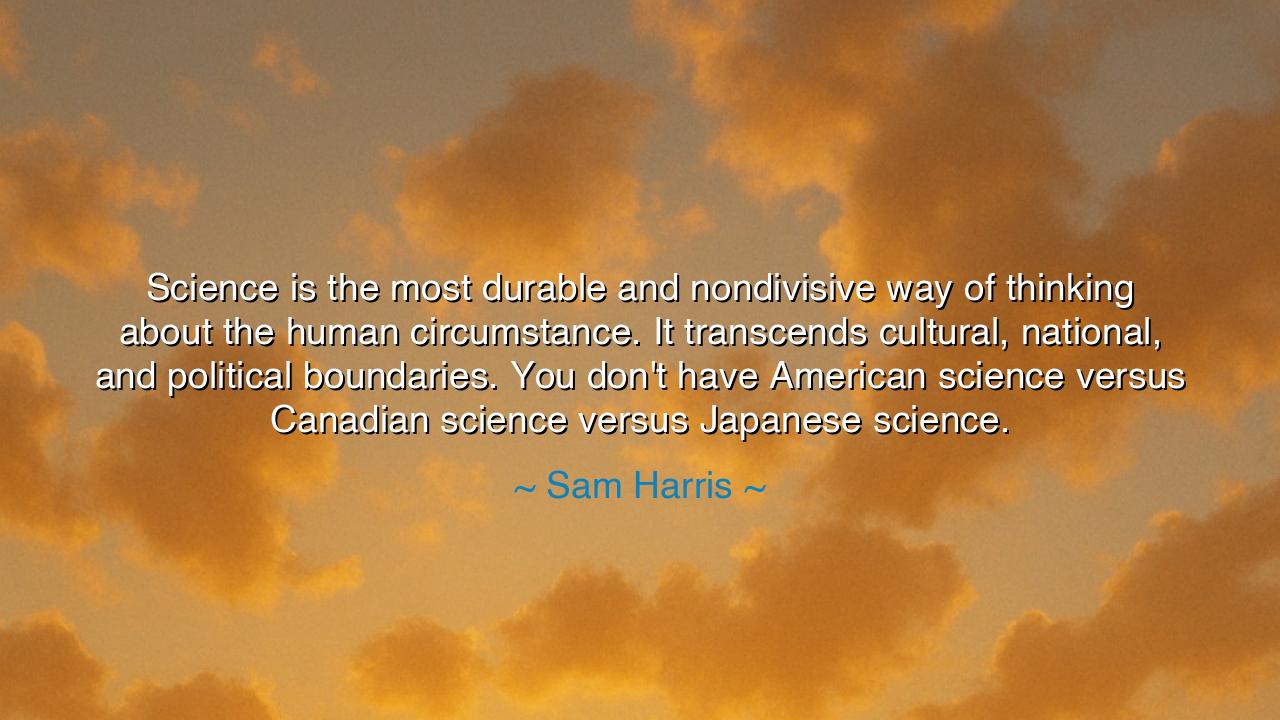
Science is the most durable and nondivisive way of thinking about
Science is the most durable and nondivisive way of thinking about the human circumstance. It transcends cultural, national, and political boundaries. You don't have American science versus Canadian science versus Japanese science.






Listen well, O children of the future, to the words of Sam Harris, who speaks with profound clarity about the nature of science. He said, "Science is the most durable and nondivisive way of thinking about the human circumstance. It transcends cultural, national, and political boundaries. You don't have American science versus Canadian science versus Japanese science." In these words, Harris highlights a fundamental truth about science: it is not a tool of division, but a unifying force—a universal language that transcends the barriers that often separate us. Science is a means by which we can understand our shared human experience, regardless of where we come from or the differences that may separate us.
In the ancient world, philosophers and scholars, despite the vast distances and cultural divides, sought a common understanding of the world. Plato, the great thinker of Athens, did not seek merely to understand the world in terms of Greek society, but in terms of a greater, universal truth that could be understood by all peoples. Similarly, Aristotle’s exploration of the natural world was not confined to the land of Greece, but sought to uncover the laws of nature that governed the entire cosmos. These great minds understood that knowledge is not limited by borders; it is a truth that, when discovered, belongs to all of humanity.
The pursuit of science throughout history has always been, at its core, a quest for universal truths. Isaac Newton, the father of modern physics, did not write his laws of motion for the English alone; they were meant for all who would seek to understand the nature of force and motion, regardless of their nation or background. The laws of nature are not bound by borders, and Newton’s brilliance lay in his ability to see beyond the constraints of his time and culture. His work transcended the walls of his birthplace and became a foundation for future generations, a gift to all of humanity.
In the modern world, we see this same spirit reflected in the collaboration that takes place across nations and cultures in the field of science. Consider the Human Genome Project, a monumental scientific endeavor in which researchers from all over the world came together to map the human genome. This great undertaking was not the product of a single nation’s efforts, nor did it belong to one people; it was a collective achievement that transcended national, cultural, and political boundaries. The goal was not the triumph of any single country, but the advancement of human knowledge for the betterment of all. It stands as a testament to the power of collaboration in science, showing that when we set aside our differences, we can achieve great things.
The lesson here, O heirs of time, is clear: Science is the ultimate unifying force. In a world often divided by political, cultural, and national borders, science has the power to bring us together through a shared understanding of truth. Whether in the fields of medicine, astronomy, or technology, science operates on the universal laws that govern the natural world—laws that apply equally to all people, regardless of their origins. It calls upon us to look beyond our differences and to seek answers that belong not to one nation, but to all of humanity.
In your own lives, strive to see the world not as divided by borders, but as a place where knowledge and truth can unite us. Do not be swayed by division, but seek the common ground where understanding can flourish. In science, there is no room for the narrowness of nationalism, for it is driven by the search for knowledge that benefits everyone, regardless of race, creed, or country. Let this truth guide you as you navigate the world: the pursuit of knowledge is the pursuit of unity. It is through this shared understanding that we will overcome the divisions that plague us and move toward a future defined by collaboration, understanding, and progress.
So, O children of wisdom, let the words of Harris and the examples of the great minds of the past guide your way. Seek to contribute to the collective knowledge of humanity, and in doing so, you will help to bridge the gaps that separate us. Whether in science, art, or human endeavor, remember that the truths we uncover belong to all of us, and it is through our shared efforts that we will build a better world for generations to come. In the pursuit of knowledge, let there be no boundaries—only the infinite horizon of discovery that unites us all.






AAdministratorAdministrator
Welcome, honored guests. Please leave a comment, we will respond soon